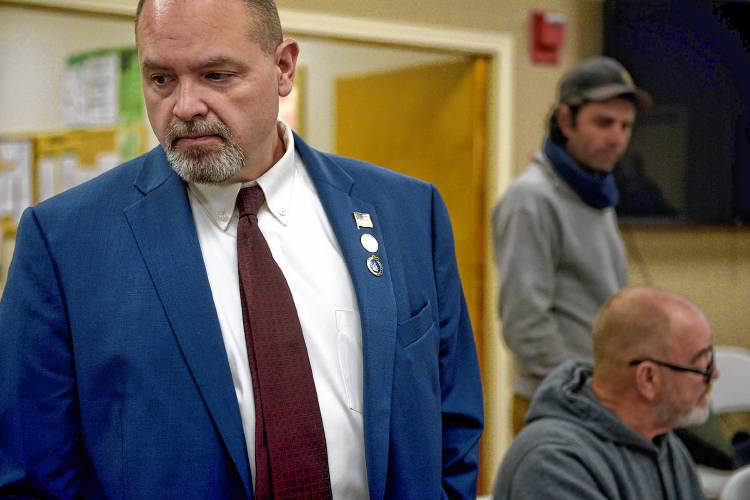Editorial: Accounting can now begin in Claremont police case

Claremont City Councilor Jonathan Stone, left, watches votes being counted with incoming city councilor Jonathan Hayden, in the background, at City Hall in Claremont, N.H. on Tuesday, Nov. 14, 2023. Hayden defeated Stone for the Ward III seat 247-241. Stone asked for a recount of the results, which did not change. At lower right is Ward III Moderator Bill Blewitt counting votes. (Valley News - Jennifer Hauck) Copyright Valley News. May not be reprinted or used online without permission. Send requests to permission@vnews.com. Jennifer Hauck
|
Published: 04-12-2024 9:01 PM
Modified: 04-14-2024 6:41 PM |
A couple of weeks ago in this space, we lauded the New Hampshire Supreme Court for ruling that the disciplinary records of former Claremont police officer Jonathan Stone, dating from the early 2000s, were subject to disclosure under the state’s Right-to-Know law. Now that they have been released, it is even more apparent why they should never have been sealed to begin with.
The contents of the records have been reported extensively in the Valley News and elsewhere, and those interested in reading the documents can do so for themselves. For those who are not, we will sum up: The series of internal affairs investigative reports made public by the city of Claremont in response to the court’s ruling portray Stone as an insubordinate, out-of-control officer who exercised poor judgment in multiple instances, including maintaining an inappropriate relationship with a teenage girl.
That’s by no means all. The reports allege that he made repeated violent threats to stage a mass shooting directed at police department brass, fellow rank-and-file officers and the then-police chief, as well as to rape the police chief’s wife. Several of the officers interviewed during the investigation were genuinely alarmed and thought Stone capable of acting on those threats.
A main purpose of the Right-to-Know law is to hold government entities accountable for their actions, or inaction. It is now possible to begin to do that.
It appears that the Claremont Police Department, to its credit, took allegations of Stone’s misconduct seriously and endeavored to investigate them thoroughly and hold him to account. That includes both supervisors and most of the rank-and-file officers. From there it goes downhill rapidly.
In 2006, Stone was terminated, a decision he subsequently appealed through his union. With an arbitration hearing pending the following spring, the city of Claremont agreed to a confidential negotiated settlement that allowed Stone to resign before the city entered any findings with respect to the internal investigations.
On the face of it, this represents egregiously bad judgment. The evidence of menacing misconduct was voluminous, and the witnesses were not only credible but also were sworn police officers. So why did the city agree to it? If there is a good rationale, we are waiting to hear it.
The ripple effect of burying this information included the fact that voters did not know relevant information about Stone’s fitness to serve in elective office when he was subsequently elected to the Claremont City Council and then to the state Legislature, where he continues to serve. Nor was the public aware of this background during a 2016 presidential campaign stop, when Stone presented Donald Trump with an AR-15 assault rifle built at a Claremont gun shop he was associated with.
Article continues after...
Yesterday's Most Read Articles
Moreover, because the city did not follow through and make findings of fact, now that the records have become public, the agreement allows Stone’s attorney to argue that the allegations contained in the reports are unproven and therefore unreliable.
The role played by the police union is also questionable. How was it that the union facilitated a quiet departure for Stone when its membership presumably included multiple officers who were potential victims of a threatened mass shooting? That’s hard to fathom.
The New Hampshire Police Standards and Training Council deserves scrutiny as well. It appears to have given Stone a free pass to surrender his police certification instead of revoking his credentials. Damien Fisher, the journalist who pried loose the disciplinary records with the aid of the American Civil Liberties Union of New Hampshire and the Union Leader newspaper, quotes then-Police Chief Alexander Scott as saying, “They had everything; what they chose to do with it is their decision.” We would ask, what exactly were the police standards being upheld by the council in this case?
In addition, Fisher reported that Scott told him the internal affairs reports were also sent to Sullivan County Attorney Marc Hathaway. He was said to be unavailable for comment. An explanation about what he did with them would be in order.
With the release of these documents, it is also possible to hold to account government bodies in real time. We await the verdict of the Republican leadership in the New Hampshire House as to Stone’s suitability to continue as a member of that body, in particular the irony that he serves on the House Criminal Justice and Public Safety Committee.
Most of all, this case demonstrates the need for the Legislature to bar confidential agreements that shield serious police misconduct from public view. They are not in the public interest, and they do a disservice to the many officers who conduct themselves in accord with the highest standards of their profession.

 Editorial: Response to campus protests only adds fuel to the fire
Editorial: Response to campus protests only adds fuel to the fire Editorial: Chris Sununu’s moral vacuum
Editorial: Chris Sununu’s moral vacuum Editorial: Gambling tarnishes America’s sporting life
Editorial: Gambling tarnishes America’s sporting life By the Way: A white nationalist’s many mistruths
By the Way: A white nationalist’s many mistruths
